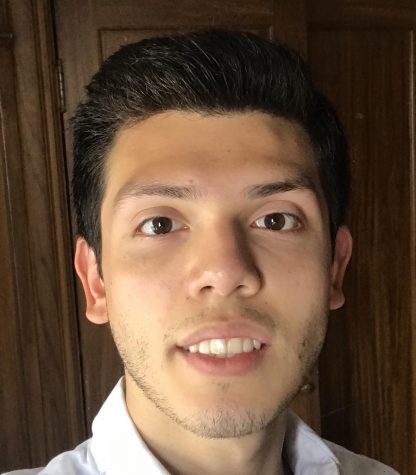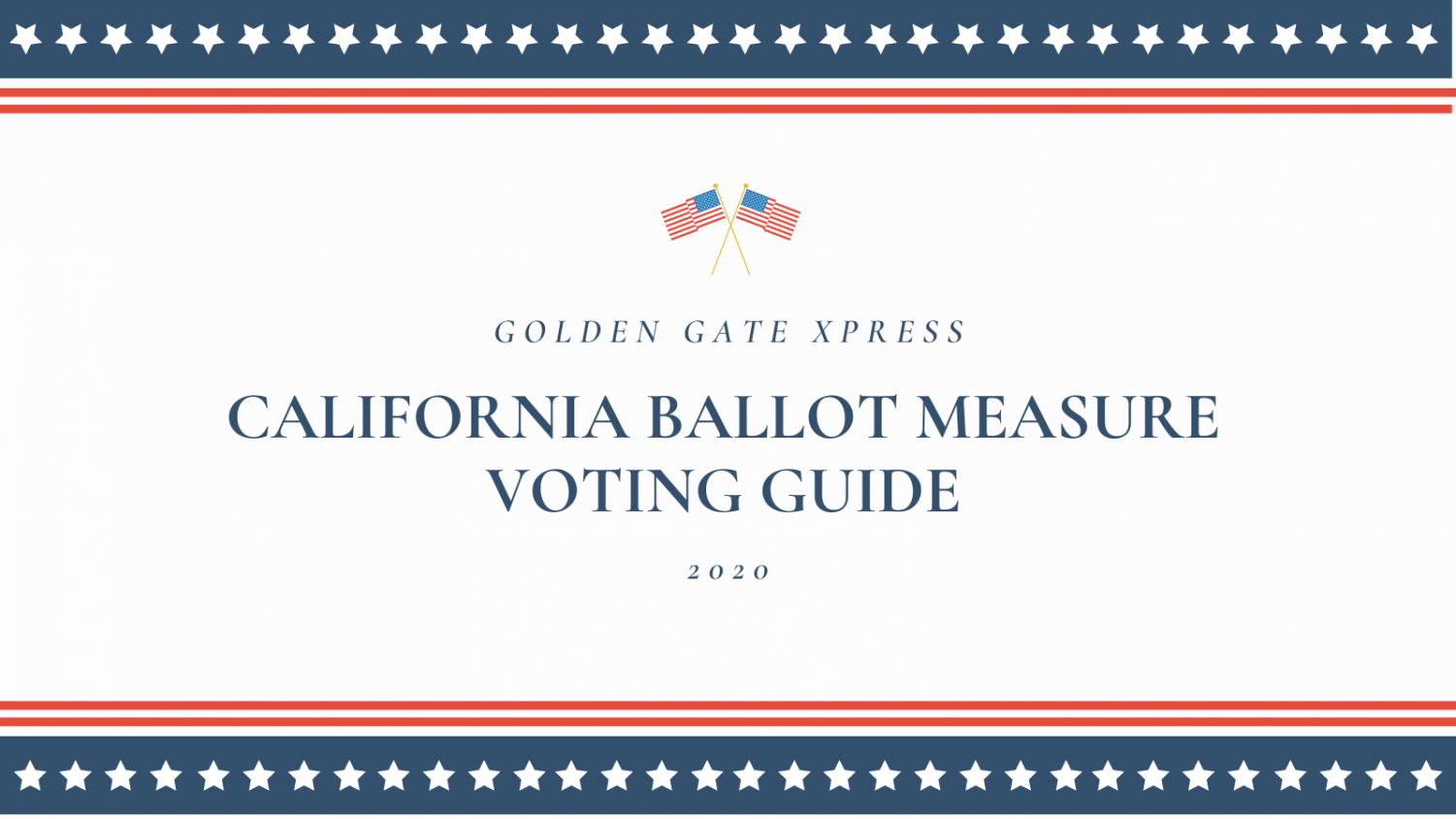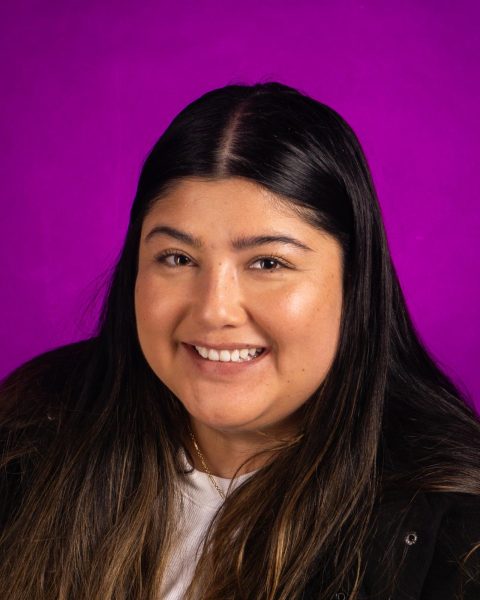Los residentes de California tienen la opción de votar para 12 medidas electorales en el mes de noviembre. Algunas de las medidas se tratan de temas que han sido popularmente debatidos , como acción afirmativa y control de renta. Para qué una propuesta pueda estar en la boleta de este año, se necesitan suficientes firmas de votantes. Se requieren 623,212 de votos para estados de iniciativa y 997,139 para las iniciativas de enmiendas constitucionales. Las firmas de votantes pasaron ocho propuestas adelante, mientras la legislatura del estado de California está buscando modificar la Constitución de California con cuatro otras propuestas es en contienda.
La guía de votación de la medida electoral de Xpress fue creada para clarificar que es lo que cada propuesta implica, tanto como quien la apoya o quién se opone a cada proporción.
Propuesta 14, la iniciativa bonos del Instituto de Investigación de Células Madre:
Si es aprobada, la propuesta 14 proveería $5.5 billones al Instituto de California para Medicina Regeneradora (CRIM) a través de bonos obligatorios generales.Los bonos están respaldados por la habilidad del estado de pedir impuestos a residentes para pagar los bonos.
Los bonos serían $7.8 miles de millones en total, dado que se proyecta un $2.3 billón en interés y desglosado en pagos anuales estimados de $310 millones por 25 años. Este total está sujeto a cambiar dependiendo de las tarifas de interés y el tiempo en que los bonos son pagados.
CRIM fue creado después de que la propuesta 71 en 2004, otorgara al instituto $3 miles de millones. De este financiamiento , se mantuvo $132 millones desde octubre de 2019. CRIM paró las solicitudes de proyectos en julio del año pasado como resultado de los fondos disponibles.Sin fondos adicionales, se espera que CRIM termine en el año 2023.
La propuesta 14 mostraría como CRIM gasta su dinero. Los fondos serían utilizados con el único propósito de investigación de células madre y costo inicial de las instalaciones, y un 7.5% asignado para gastos operacionales. Terapias y métodos de tratamiento para trastornos neurológicos serían asignados $1.5 miles de millones; ensayos clínicos en humanos, tratamientos e instalaciones de cura 1.5%; instalaciones financiadas por el estado bajo el Programa de Laboratorios Compartidos 0.5%.
Si la propuesta es aprobada CRIM cambiaría la forma en que funciona. El número de miembros que gobiernan CRIM bajo el Comité de Supervisión Ciudadana Independiente (ICOC) subiría a 35, actualmente está en 29. Un cuarto grupo aconsejado el ICOC, específico a tratamientos y cura, sería agregado a los grupos que ya existen en fondos del estudio médico, normas de estudios e instalaciones subsidios. CRIM también quiere establecer un límite de empleados trabajando tiempo completo y en programas de entrenamientos para estudiantes de universidad y posgrado interesados en la investigación con células madre.
Los defensores de la propuesta 14 incluye: UC Board of Regents
Los oponentes de la propuesta 14 incluyen: Center for Genetics and Society
Propuesta 15, Impuestos en la iniciativa de financiamiento de propiedades comerciales e industriales para la educación y el gobierno local
Si es aprobada, la propuesta 15 recolectará impuestos en todas las propiedades comerciales e industriales — con la excepción de la agricultura comercial — basados en los valores del mercado actual, en lugar de su precio inicial de compra. El cambio empezará en el año fiscal de 2022-2023.
Las propiedades actualmente pagan impuestos con relación a los precios de compra y ven un aumento de 2% o aumento igual a la tasa de inflación – la cantidad que sea menor.
Propiedades residenciales, propiedades de agricultura y los dueños de propiedades comerciales e industriales con un valor conjunto de $3 millón o menos será exento de la Proporción 15.
El dinero recaudado de la propuesta 15 primero cubriría los gastos de implementación del condado, después estos se irían al estado para complementar las disminuciones en los ingresos resultantes del aumento de las deducciones de impuestos. Los ingresos restantes se dividirán en lugar de ir al Fondo General: entre 60% a los gobiernos locales y distritos especiales y 40% a los distritos escolares y colegios comunitarios, en lugar de ser proporcionados al Fondo General. Estos ingresos serán divididos en un Fondo de impuestos para la propiedad de escuelas locales y colegios comunitarios recién creados.
El desglose adicional del dinero destinado a la educación se vería así: 89% para las escuelas públicas y autónomas y las oficinas de educación del condado, 11% para colegios comunitarios y un mínimo adicional de $100 para todas las escuelas por estudiante de tiempo completo (ajustado anualmente).
Los defensores de la propuesta 15 incluyen a Kamala Harris, candidata a vicepresidente del Partido Demócrata, el senador Bernie Sanders, el senador de California, Scott Wiener, London Breed, alcaldesa de San Francisco, la alcaldesa de Oakland, Libby Schaaf y el alcalde de Los Ángeles, Eric Garcetti. Los distritos escolares de Los Ángeles y San Francisco también apoyan esta propuesta.
Los oponentes de la propuesta 15 incluyen: California Black Chamber of Commerce, California Small Business Association, California NAACP State Conference y California Hispanic Chambers of Commerce.
Propuesta 16, Revocar la propuesta 209, enmienda de acción afirmativa
Si es aprobada la propuesta 16 revocaría la propuesta 209 que fue establecida en 1996, permitiendo tomar en cuenta la raza, sexo, color de piel, etnia y nacionalidad durante el proceso de solicitud o admision a un empleo público, a la educación pública y a la contratación pública.
Para clarificar, la acción afirmativa en la forma de cuotas raciales fueron consideradas inconstitucionales en 1978, bajo el punto de referencia del caso de la Corte Suprema Regentes de la Universidad de California v. Bakke. La Corte Suprema también declaró que cualquier forma de acción afirmativa debe ser revisada por un escrutinio estricto.
El apoyo hacia la acción afirmativa crece considerablemente debido al deseo de los proponentes en tener universidades diversas. Siguiendo la implementación de la propuesta 209 en 1998, la Universidad Estatal de California registró dos tercios menos en inscripciones de personas pertenecientes a un grupo minoritario en el tados. El sistema de la Universidad de California vio una disminución de grupos subrepresentados –– afroestadounidenses, latinos, isleños del pacífcio, e indios americanos –– de 20% en 1955 a 15%.
Los oponentes argumentan que la propuesta 16 discrimina más en contra de los estudiantes y aplicantes merecedores y juzgan a los individuos por su ascendencia en lugar de su mérito. El ex representante del distrito 12 del Congreso de California, Tom Campbell mencionó que los asiáticos americanos representan 15.3% de la población de California, pero son 39.72% de los estudiantes inscritos en las universidades UC. El agregó que esta propuesta crearía una tensión entre las comunidades Asiáticos Americanos y Negras y Latinas porque “las políticas son ineludiblemente racial”.
Los defensores de la propuesta 16 incluyen a Kamala Harris, candidata a vicepresidente del Partido Demócrata; la Junta UC de Regentes; Timothy P. White Canciller del sistema universitario CSU; y el caucus legislativo de las Islas del Pacifico Asiatico.
Los oponentes de la propuesta 16 incluyen a San Diego Asian Americans for Equality, Asian American Coalition for Education y el Pacific Legal Foundation
Propuesta 17, Restaurando el sufragio para personas en libertad condicional
Si es aprobada, la propuesta 17 restaura el derecho de votar para 57,000 californianos que están en libertad condicional por condenas de delitos graves.
Actualmente, las personas en libertad condicional por condenas de delitos graves no son elegibles para votar hasta que se complete su libertad condicional. Si la propuesta es aprobada, California sería el vigésimo estado en permitir que las personas en libertad condicional voten. Ahora, California es uno de tres estados que requiere que las personas con condenas de delitos graves terminen su libertad condicional para recuperar su voto. En California, individuos que cumplen tiempo en prisión en prisiones estatales o federales, cumplen una sentencia federal en una prisión estatal, esperando la transferencia de una convicción de un delito grave o aquellos que han violado su libertad condicional son inelegibles para votar.
Propuesta 17 también abordaría el encarcelamiento masivo de afro estadounidense y latinos. Un estudio de 2016 del Instituto de Política Pública de California, encontró que afro estadounidenses, que forman 6% de la población adulta del estado, constituye el 26% de los que están en libertad condicional. De igual manera, los latinos forman el 35% de la población adulta y constituyen al 40% de los que están en libertad condicional. Personas blancas forman el 26% de la población adulta y constituyen el 7% de los que están en libertad condicional.
Los oponentes de la propuesta 17 argumentan que el derecho de votar no debe ser restaurado hasta que los que han cometido delitos graves completen su sentencia.
Los defensores de propuesta 17 incluyen a Kamala Harris, candidata a vicepresidente del Partido Demócrata; Senador del estado Scott Wiener; ACLU de california; y la Liga de Mujeres Votantes de California
Los oponentes de la propuesta 17 incluyen a The Election Integrity Project California.
Propuesta 18, Votación primaria de enmienda para votantes de 17 años
Si es aprobada propuesta 18 permitiría que personas de 17 años de edad voten en la elección primaria si cumplen los 18 años antes de la elección general.
propuesta 18 convertiría a California en el decimonoveno estado, junto con Washington D.C., que permite que este grupo vote en las elecciones primarias.
Mientras no hay un recuento exacto de cuántos jóvenes de 17 años serían votantes elegibles, Lucile Packard Foundation for Children ‘s Health estima que hay más de 2 millones de personas de entre 14 y 17 años de edad en el estado de California.
Este proyecto de ley se presentó por primera vez por el asambleísta del Sur de San Francisco, Gene Mullin en 2004. El año pasado, el hijo de Mullin, el asambleísta de San Mateo, Kevin Mullin, re-introdujo el proyecto de ley. Este es su sexto intento, pero es la primera vez que llega al Senado. Pasó con un voto de 29-2, con dos senadores Republicanos votando por el proyecto de ley.
La California Association of Student Councils argumenta que la propuesta corregiría la desventaja que enfrentan estas personas jóvenes, ya que no se les permite opinar quien participará en la boleta de las elecciones generales. “Sin una exposición completa al proceso electoral, no pueden presentar su voto más educado en las elecciones generales”, una declaración leída de la asociación.
The Election Integrity Project California, Inc. argumenta que porque los jóvenes de 17 años legalmente todavía son considerados menores de edad, están muy influenciados por sus padres y “superiores inmediatos.” “Esto, nuevamente hace que sea menos probable que expresen sus propias elecciones independientes y pensadas si se les permite votar”, dijo el grupo.
Los defensores de la propuesta 18 incluyen a The California Association of Student Councils
Los oponentes de la propuesta 18 incluyen a The Election Integrity Project California, Inc
Propuesta 19 Transferencias de impuestos a la propiedad, exenciones e ingresos para agencias de incendios forestales y enmienda de condados
Si es aprobada la propuesta 19 permitiría a los propietarios de viviendas elegibles transferir sus impuestos a la propiedad a una casa más costosa en cualquier parte del estado con una tasa impositiva ajustada al alza, en lugar de una tasa nueva. Esto protegería a los propietarios elegibles de tener que pagar impuestos adicionales por una propiedad que se adapta mejor a sus necesidades. Los propietarios de viviendas mayores y las personas con discapacidades también pueden mudarse a una nueva propiedad hasta tres veces, en lugar del límite actual de una vez. Las víctimas de incendios forestales y desastres naturales no serían elegibles para mudarse más de una vez.
Actualmente, los propietarios discapacitados, mayores de 55 años o víctimas de desastres naturales son elegibles para transferir sus tasas de impuestos de su propiedad original si se mudan a una nueva casa del mismo valor o menor dentro del mismo condado. Para propiedades heredadas, una tasa de impuesto a la propiedad más baja sólo sería posible cuando las propiedades son usadas como residencias principales y usadas solo en el primer $1 millón entre el precio de compra original y su valor de mercado.
Las propiedades heredadas, como las casas de vacaciones familiares y propiedades de negocio, estarían sujetas a reevaluación si excedieran una diferencia de $1 millón entre la compra original y el valor de mercado. Cualquier ingreso tributario adicional se destinaría al Fondo de Respuesta a Incendios de California y al Fondo de Protección de Ingresos del Condado. La CRPF reembolsaría a condados por pérdidas relacionadas a ingresos resultante de la propuesta, y la CRPF financiaría la dotación de personal de extinción de incendios y personal de estación a tiempo completo.
Debido a los aumentos de impuestos propuestos en la propuesta para las propiedades heredadas, la declaración de impacto fiscal afirma que generaría decenas de millones de dólares a gobiernos de nivel local y estatal, incluyendo el financiamiento escolar y de protección contra incendios.
Los defensores argumentan que esta medida no solo ayudará a las víctimas de desastres naturales a encontrar viviendas más fácilmente en un mercado más costoso, sino que también abrirá más viviendas familiares después de que los propietarios mayores se muden a una propiedad más pequeña. También argumentan que esto cerraría una escapatoria que permite a residentes no californianos adinerados evitar pagar “una parte justa de los impuestos a la propiedad sobre casas de vacaciones, propiedades de ingresos y alquileres frente a la playa que poseen en California.”
Los opositores argumentan que esta medida es una versión revisada de una propuesta anterior fallida que fue ampliamente votada en contra, como la propuesta 5 del 2018.
Los defensores de la propuesta 19 incluyen al Gobernador Gavin Newsom, California Professional Firefighters, Californians for Disability Rights.
Los opositores a la propuesta 19 incluyen a la Howard Jarvis Taxpayers Association
Propuesta 20, Sentencia Penal, Libertad Condicional Y Iniciativa De Colección De ADN
Si se aprueba, la propuesta 20 añadiría restricciones sobre elegibilidad de libertad condicional para personas encarceladas por crímenes no violentos. Para obtener libertad condicional, la comisión revisora de libertad condicional tendría que considerar factores adicionales como los lazos familiares, edad, salud mental y actitud sobre el crimen de la persona, junto con las condiciones del crimen.
La propuesta también clasificaría 51 ofensas como crímenes violentos o ofensas que de otro modo no son elegibles para libertad condicional. Crímenes como robo de armas de fuego, fraude de tarjeta de crédito y crimen organizado minorista serían definidos como delitos no tipificados – crímenes que pudieran ser cargados como falta o delito basado en las circunstancias. Ciertos delitos no tipificados o delitos — robo, prostitución con un menor de edad, posesión de droga — requeriría que los infractores envíen una muestra de ADN a las bases de datos estatales.
El Analista Legislativo y Director de Finanzas estima que esta propuesta les costaría decenas de millones de dólares a las instalaciones correccionales estatales y locales debido a que existiría un mayor número de sanciones por crímenes relacionados con el robo. También le costarían millones de dólares anualmente a cortes estatales y locales debido a requisitos más estrictos de libertad condicional y delitos.
Actualmente, el estado tiene una lista de crímenes permitidos a sentencias más cortas bajo la propuesta 57 del 2016, un esfuerzo para alentar a personas encarceladas a participar en programas de rehabilitación. Entre los delitos se encuentran: abuso conyugal; trata de personas adolescentes; y violación.
Defensores de la propuesta 20 incluyen a la Junta de Supervisores de Orange County, Los Angeles Police Protective League y el Peace Officers Research Association of California.
Quienes se oponen a la propuesta 20 incluyen a el ex gobernador Jerry Brown, ACLU de California del norte; y el SEIU California State Council.
Propuesta 21, Iniciativa de control de alquileres locales
Si se aprueba, la propuesta 21 permitiría a gobiernos locales crear un control de renta para propiedades de más de 15 años que son poseídas por propietarios con más de dos propiedades. Estas especificaciones modifican la propuesta 10 de 2018, ahora rechazada.
La propuesta 21 también permitiría a propiedades bajo control de renta aumentar sus cargos mensuales solo “hasta 15% durante tres años del alquiler del inquilino anterior por encima de cualquier aumento permitido por ordenanza local,” de acuerdo con el resumen de la boleta de la propuesta. La propuesta también reemplazaría las actuales reglas de control de renta locales.
El Analista Legislativo y Director de Finanzas estima que esto puede reducir ingresos locales y estatales por decenas de millones de dólares anualmente, dependiendo de la acción del gobierno local.
El control de rentas en California ha sido un tema de interés ampliamente discutido– 56 de 58 condados de California rechazaron el control de renta en el 2018. Sin embargo, las elecciones del 2018 revelaron que los californianos estaban en su mayoría a favor del control de renta, pero rechazaron las especificaciones de la propuesta anterior.
Defensores creen que el control de renta protegerá a ciudadanos de bajos ingresos y de clase media de ser desplazados de sus casas, especialmente en ciudades de alta población con vivienda limitada, como San Francisco.
Quienes se oponen a la propuesta argumentan que esto desalentaría al sector privado de crear unidades de vivienda asequibles en el mercado. Regulaciones tolerantes sobre procesos de permisos y zonificación pudieran hacer esto posible.
Defensores de la propuesta 21 incluyen al Senador Bernie Sanders, a la Representante Barbara Lee, a la Representante Maxine Waters; AIDS Healthcare Foundation, Los Angeles Urban League y Eviction Defense Network.
Quienes se oponen a la propuesta 21 incluyen a el Presidente Sid Larkey de California Rental Housing Association, Californianos para Vivienda Responsable, State Building and Construction Trades Council of California, y la Conferencia Estatal NAACP de California.
Propuesta 22, Conductores de Aplicaciones en línea contratados como contratistas y la iniciativa de pólizas laborales
Si se aprueba, la propuesta 22 definiría como contratistas independientes a conductores de viaje compartido y entrega basados en aplicaciones. En lugar de apegarse a los beneficios y protecciones que empleados reciben en todo en el estado, estas empresas serían requeridas a proveer beneficios alternativos que cumplen con las especificaciones de sus trabajadores temporales, incluyendo “compensación mínima y subsidios de cuidado de salud basados en tiempo de conducción, aseguranza de vehiculo, entrenamiento de seguridad y pólizas de acoso sexual”, de acuerdo con el resumen official de la propuesta del estado.
La propuesta 22 anularía el Proyecto de ley 5 de la Asamblea de California en lo que respecta a conductores basados en aplicaciones. AB 5 es una respuesta al caso Dynamex Operations West, Inc. v. Superior Court de la Corte Suprema de 2018 que clasifica a la mayoría de trabajadores en el estado como empleados en lugar de contratistas independientes si el/la empleador(a) no puede probar cada parte de una prueba de tres partes.
Bajo AB 5, si los/las empleadores(as) no logran probar estos tres componentes de la prueba, sus empleados(as) tienen derecho a beneficios como salario mínimo, seguro médico y licencia por enfermedad. Bajo la propuesta 22, los/las empleadores(as) deben clasificar conductores basados en aplicaciones como contratistas independientes a no ser que la compañía fije las horas de los/las conductores(as), requiera la aceptación de peticiones de viaje o entrega específicas o restrinja el trabajar para otras empresas.
Servicios de entrega basados en aplicaciones y programas de viaje compartido como Uber, Lyft y Doordash están pidiendo una excepción, ya que la estructura de sus negocios depende de trabajadores temporales de base digital que tienen la libertad de trabajar tanto o tan poco como quieran.
Esta propuesta puede aumentar levemente los ingresos públicos de impuestos sobre ingresos personales del estado, según un informe del Analista Legislativo. Si estas empresas ya no tienen que pagar para beneficios de empleados estatales, tarifas de entrega y viaje más bajas podrían seguir. Tarifas más baratas pueden atraer a más clientes y generar más ingresos para conductores.
Defensores de la propuesta 22 incluyen a la Conferencia Estatal NAACP de California, California Black Chamber of Commerce, California Hispanic Chambers of Commerce, CalAsian Chamber of Commerce y la California Small Business Association.
Quienes se oponen a la propuesta 22 incluyen al candidato a presidente Joe Biden, la candidata a vicepresidente Kamala Harris, la senadora Elizabeth Warren, la Federación Laboral de California y el Consejo de Trabajadores del Estado de California.
Propuesta 23, Iniciativa de requisitos del Clínicas de Diálisis
Si se aprueba, la propuesta 23 requeriría que Clínicas de Diálisis tengan un médico presente durante todas las horas de operación, aunque un enfermero especializado o un asistente médico pueda ser suficiente si hay una escasez de médicos en el área.
Adicionalmente, clínicas deben reportar infecciones relacionadas con diálisis al Departamento de Salud Pública de California y a la Red Nacional de Seguridad Sanitaria cada tres meses o enfrentar multas de hasta $100.000,uscar aprobación del estado antes de cerrar o reducir el horario de la clínica, recibir aprobación del oficial principal de la clínica bajo pena de perjurio y atender a todos los pacientes sin considerar su fuente de pago por la atención.
En California hay aproximadamente 600 centros que tratan a los casi 80,000 pacientes del estado cada mes, según la Oficina del Analista Legislativo. La oficina también encontró que aproximadamente el 75% de estos centros son propiedad de dos empresas privadas con fines de lucro: Davita, Inc. y Fresenius Medical Care.
La propuesta 23 se basa en la propuesta 8 de 2018. La propuesta que fue rechazada por un margen de 2.4 millones de votos, tenía la intención de maximizar los beneficios del centro. Según Calmatters, una organización de medios no partidista que cubre la política de California, esta lucha fue la campaña electoral más cara de la historia, con Davita Inc. y Fresenius Medical Care gastando $111 millones combinados para ir en contra del sindicato Service Employees International Union-United Healthcare Workers en 2018.
Esta propuesta probablemente aumentaría los costos del gasto estatal y local por decenas de dólares, así como el costo del servicio de diálisis debido a las demandas del personal, según la Oficina del Analista Legislativo.
Los defensores de la propuesta 23 incluyen a el Partido Democrata de California y la Federación Laboral de California.
Los opositores de la propuesta 23 incluyen a la Asociación Médica de California, Ciudadanos Pacientes de Diálisis y la Conferencia Estatal NAACP de California
Propuesta 24, Iniciativa de ley y agencia de información personal del consumidor
Si se aprueba, la propuesta 24 expandiría sobre la Ley de Privacidad del Consumidor de California de 2018, creando una nueva agencia gubernamental – la Agencia de Protección de Privacidad–diseñada para regular privacidad de datos. A los consumidores también se les permitiría cambiar información incorrecta, prohibir el intercambio de datos y proteger la “información personal confidencial”. Las sanciones por infracciones comerciales se triplicarían por infracciones de datos de menores de 16 años.
La Ley de Privacidad del Consumidor de California inicialmente les dio a los consumidores del estado opinión sobre cuánta información personal pueden recopilar las empresas. Desde entonces, las empresas deben revelar cómo se utilizan y almacenan los datos personales, permitir que los consumidores eliminen información personal, optar no vender sus datos y no pueden discriminar a los clientes por hacer algún cambio. La propuesta 24 busca reforzar aún más estas medidas de privacidad.
Organizaciones como Common Sense y Consumer Watchdog dicen que esta propuesta convertiría a California en el ejemplo de las leyes de protección de la privacidad, especialmente como un estado dirigido por grandes empresas tecnologicas.
“Especialmente después de covid, la gente será más sensible a preocupaciones sobre la privacidad”, dijo en junio el desarrollador de bienes raíces con sede en San Francisco y presidente de Californianos por la Privacidad del Consumidor, Alistair Mactaggar. Mactaggar también presionó fuertemente por la ley de privacidad de 2018.
Quienes se oponen argumentan que simplemente no ha habido tiempo suficiente para determinar qué tan efectiva es la ley de privacidad existente, ya que entró en vigencia este julio.
Tememos que la propuesta 24 le quitaría autoridad a las regulaciones de privacidad existentes en California al hacer más pesado para los consumidores prohibir a las grandes empresas tecnológicas vender sus datos confidenciales”, dijo Linda Sherry, directora de Prioridades Nacionales de Consumer Action, en una declaración.
Defensores de la propuesta 24 incluyen a Common Sense y Consumer Watchdog
Quienes se oponen a la propuesta 24 incluyen a ACLU de California, Council on Islamic American Relations – California, Consumer Federation of California y Media Alliance.
Propuesta 25, Referéndum para reemplazar la fianza en efectivo con evaluaciones de riesgo
Si se aprueba, la propuesta 25 reemplazaría el actual sistema de fianza en efectivo para los sospechosos de delitos que están detenidos con una evaluación de riesgos para determinar las condiciones de una posible liberación antes del juicio.
Actualmente, los sospechosos de delitos son elegibles para ser puestos en libertad condicional antes del juicio si se paga una fianza en efectivo y prometen regresar a la corte para su juicio y audiencias. La fianza, que se reembolsa a los sospechosos independientemente de los resultados del juicio, se puede depositar utilizando fondos personales o agentes comerciales de fianzas que cobran tarifas no reembolsables. No hay límite para cuánto pueden costar las tarifas, aunque el promedio suele ser del 10%, según el Departamento de Seguros de California.
Si se aprueba, la propuesta 25 convertiría a California en el primer estado en poner fin a la fianza en efectivo, que será reemplazada por evaluaciones que utilicen “herramientas [que] se demostrará mediante investigaciones científicas que son precisas y confiables”, según el proyecto de ley. En las evaluaciones, los presuntos delincuentes se clasificarían en una de tres categorías: riesgo bajo, medio y alto. Se denegaría la liberación antes del juicio a las personas de alto riesgo, se permitiría la liberación de bajo riesgo dadas las circunstancias específicas y el riesgo medio podría estar sujeto a cualquiera de las opciones según las reglas de la corte. A aquellos a los que se les niegue la libertad antes del juicio se les permitiría argumentar la evaluación ante un juez.
Quienes se oponen al proyecto de ley argumentan que las herramientas posibles para realizar evaluaciones conllevan el riesgo de prejuicios raciales. “Si bien todos estamos de acuerdo en que la reforma de la fianza es necesaria, este costoso e imprudente plan utilizará algoritmos informáticos con prejuicios raciales para decidir quién queda atrapado en la cárcel y quién sale libre. Eso no es correcto”, dijo el portavoz de Californians Against the Reckless Bail Scheme, Jeff Clayton.
Los defensores de la propuesta 25 incluyen a la representante Karen Bass, el senador estatal Scott Wiener, Partido Demócrata de California, Asociación de Maestros de California, Liga de Mujeres Votantes de California y la Asociación Médica de California
Quienes se oponen a la propuesta 25 incluyen a la Conferencia Estatal NAACP de California,California Hispanic Chambers of Commerce, Crime Victims United of California y la California Black Chamber of Commerce









